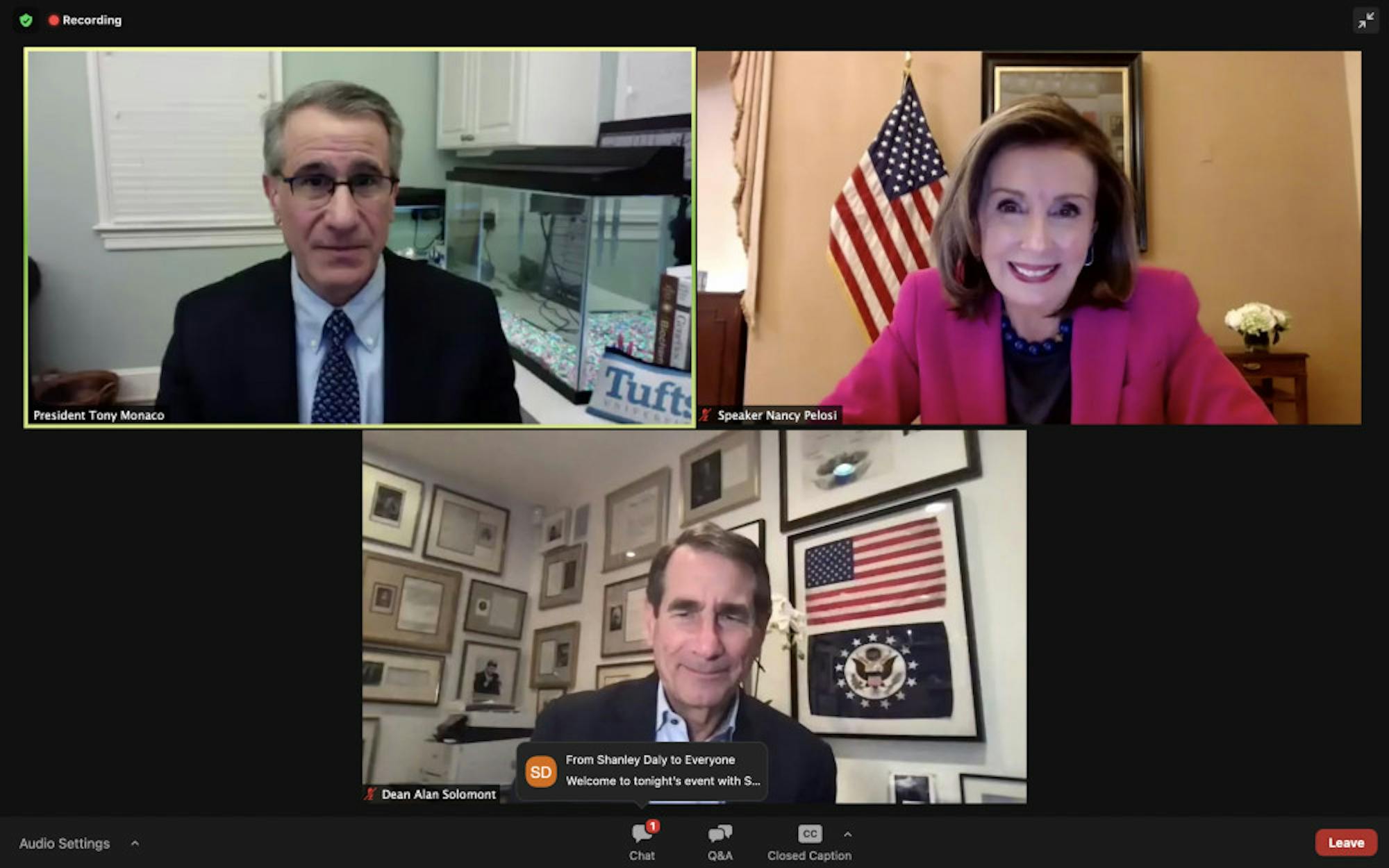Speaker of the United States House of Representatives Nancy Pelosi addressed the Tufts community in the first event of the spring 2021 Jonathan M. Tisch College of Civic Life's Distinguished Speaker Series. Her talk, held on Zoom, was the Alan D. Solomont Lecture on Citizenship & Public Service and over 3,000 individuals registered for the event.
University President Anthony Monaco opened the event by introducing Pelosi and Dean of Tisch College Alan Solomont, who moderated the event. Monaco referenced some of Pelosi’s many achievements in the public service, which included her work in making health care more affordable and accessible, stimulating economic growth and addressing government corruption.
Pelosi and Solomont’s discussion began with the recent riots on Capitol Hill. Pelosi discussed the sadness surrounding the riots but also announced that she was happy the House resumed work right away.
“It was a personal thing for me to see the assault on the Capitol for many reasons … but [I was] so happy that we got right back in to continue our work,” Pelosi said.
Pelosi also talked about the strides the House has made in female representation since she first assumed office in 1987. At that time, the Democratic Party had 12 female representatives, and the Republican Party had 11. Today, those numbers are 89 and 30, respectively.
Solomont asked Pelosi if there is a single legislative accomplishment she is most proud of from her time in Congress, and she said nothing compares to the Affordable Care Act, which was signed into law in 2010.
“That probably made such a big difference in people’s lives,” Pelosi said. “Before, if you had a preexisting medical condition it was almost impossible to get health care that you can afford. Impossible unless you were the wealthiest of the wealthiest.”
Pelosi also spoke to her strategies for unifying as large and diverse a group as the Democratic Party in the House. Pelosi reported that 70% of the caucus is made up of women, minorities and individuals who identify as LGBTQ+.
“We have a very diverse group in the caucus,” Pelosi said. “What brings us together is not any one person. What brings us together are our values.”
Solomont referenced the recent support young people have given to the Democratic Party and asked Pelosi how she intends to maintain that support throughout subsequent elections.
“At Tisch College, my colleagues are among the nation’s leading authorities on the civic and political engagement of young people,” Solomont said. “We study youth voting, and young people were absolutely decisive in the 2018 elections and again in the 2020 election. They voted overwhelmingly for Democrats.”
In response, Pelosi underlined the importance of listening.
“The first thing we have to do as far as young people are concerned is to listen,” Pelosi said. “They communicate in different ways than many of us did … when we listen to them, what we hear … is that they care about this planet.”
She cited climate change as a primary concern of young voters, adding anti-discrimination policies and education as other key issues.
“Climate change is a very big issue for them,” Pelosi said. “Issues that relate to respecting the dignity and worth of a person … when I listen to them, they talk about education and what those opportunities are and how affordable they are, and how can we all help make sure they are not burdened with enormous debt as we go forward.”
Before moving into a question-and-answer period with students, Solomont referenced the 2016 presidential election and the 70 million votes received by former President Donald Trump in 2020. He asked Pelosi what she believed the appeal was for so many Americans.
“I believe that in '16, there was a decision that people made if they believed that there was a place for them and their family in the future, they probably did not vote for him," Pelosi said. “[Trump voters’] fears were automation, immigration, globalization.”
However, Pelosi expanded that she is optimistic about the next four years with President Joe Biden.
"I think he's a real unifier, a real respecter of people's concerns … the things that are of concern … how are they going to pay the medical bills, how are they going to pay tuition, how are they going to pay the rent," Pelosi said.
Solomont introduced the individuals who had been selected to ask questions, and gave Pelosi the chance to respond to each one before wrapping up the event.






